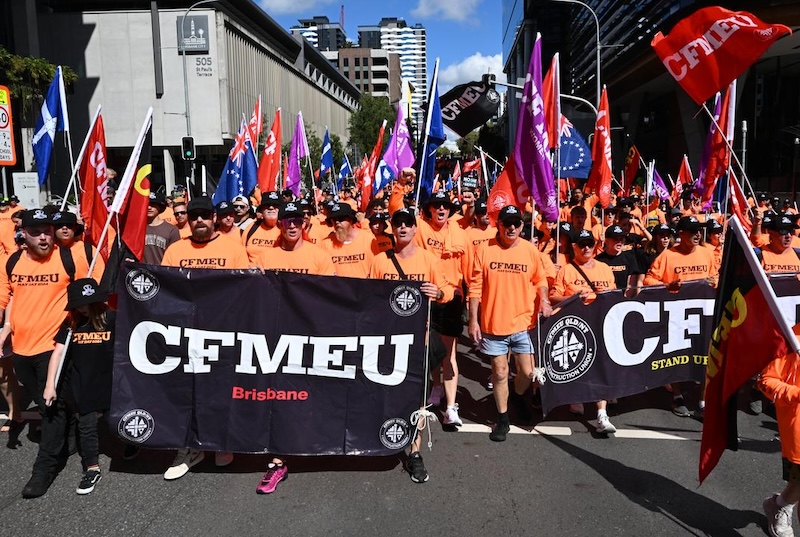The latest revelations of organised crime in the CFMEU show that royal commissions, police, union bosses, the crime commission and the construction giants have all been unable to keep gangsters out of the building industry. Marcus Strom with this oped.
Ten years ago I broke the story that organised crime had gained a foothold on the Barangaroo building site in Sydney using labour hire firms with the knowledge and support of senior figures in the CFMEU building union in NSW.
After a $50 million royal commission and much hand-wringing, nothing seems to have changed.
Revelations in Nine newspapers and on 60 Minutes – which followed the sudden resignation of colourful CFMEU boss John Setka – that figures associated with organised crime in NSW and Victoria regularly still deal with the union to gain access to the industry are an indictment on people the labour movement who have turned a blind eye to this.
But the people really laughing all the way to the bank are the big construction firms, who earn billions with full knowledge of how the game works. What the crooks rake in through subcontracting is small beer in comparison.
Those on the left who point out the great pay deals the CFMEU gets for its members use that to excuse their shrugs, their blind eyes or even to justify their methods. However, they forget that Jimmy Hoffa got great results for American truck drivers when he ran the Teamsters Union – and he was a fully-owned subsidiary of the Mob.
My father and my grandfather were both communists, and they told me that if you’re going to be a militant at work, you need to be cleaner than clean. That working-class lesson seems to have been lost.
If the only result of the latest sad tale is the CFMEU is split up and the building division kicked out of the ALP, that’s a neat fix for the Prime Minister, whose factional opponents on the left of the Labor Party rely on CFMEU votes at party conferences and for parliamentary pre-selections.
Meanwhile, hundreds of thousands of the country’s hardest working people on building sites across Australia are going to be thrown to the dogs.
Lendlease, Multiplex and the rest of them all know how it works on the ground. Some of them, directly or via subcontractors, enter sweetheart deals with the union to pay union dues.
The quid pro quo
In return, the CFMEU ensures projects aren’t delayed. That means safety can be compromised.
Just last year, a crane at the Fish Market project in Sydney collapsed at a Multiplex site. It’s lucky no one was killed.
It’s no surprise that the labour-hire firm is the way criminal elements try to gain access to the lucrative building industry, where cash jobs and other forms allow money to be laundered, and you don’t need a character reference or any particular skills.
All you need to run a labour hire firm all is a phone, an ABN – and contacts. No big capital outlays – maybe some debt to get some scaffolding gear.
The icing on top is if you land one of the handful of labour hire enterprise agreements with the CFMEU that gives you prime access to major building sites in Sydney, Melbourne or Brisbane.
Another sad aspect of the whole subcontracting farce is the down-skilling in the building industry. The medium-sized contractors that are the life-blood of skills and experience find it hard to compete with the cheap subcontractors below.
The result can mean shoddy building work, and a housing stock that is sub-par. We’ve all seen the outcome at places like the developments at Mascot.
The big companies know all this. A senior Lendlease manager once told me that only two or three companies in Australia know how to run big infrastructure and building projects. Their profits aren’t in jeopardy.
They are raking in billions, knowing exactly how the building game works.
Dust cloud over worker safety: asbestos alarm at Sydney’s first skyscraper, the AMP rebuild
Royal Commissions
In the early 1990s, at the time of the Gyles Royal Commission into Productivity in the Building Industry in NSW, newspaper columnist Paddy McGuinness recounted a maxim long held in the building industry: it was either dominated by organised crime or communists.
One of the last communists to run the building unions in Australia was Stan Sharkey, who died just last month. At his funeral, a former CFMEU leader, John Sutton, told everyone there what he thought of the current crop of union leaders in comparison to people like Stan Sharkey.
Sutton told the funeral: “Stan was a mindful militant. He was dead against arrogant, hubristic, bully-boy trade unionism. I saw him give some fierce dressing-downs to officials who thought they had the power and were lording it over employers or workers. Stan understood the power belonged to the workers and was not to be used for the ego or back pocket of some rooster who was too big for his boots.
“He was critical of those who indulged in reckless, bully-boy behaviour. And critical of those who found the weasel words to insist that all was well. Stan had no time for apologists; if something was wrong, it had to be dealt with.”
The royal commissions, the police, the bosses, and the crime commission have all shown they can’t control organised crime in the building industry. Only a union with principles and integrity backed by its militant working-class members can do that.
Australia’s building workers deserve a union that rediscovers its heritage to fight for the future of the working class. That means unionists chucking gangsters out of the building industry.
Marcus Strom is a journalist and media adviser. He was a senior journalist at the Sydney Morning Herald until 2017, President of MEAA Media, the journalists’ union (2017-2022) and Press Secretary to Minister Ed Husic MP until February 2023.

